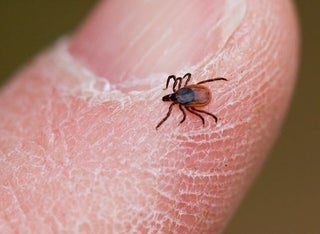Last Updated on January 10, 2026 by Rida Gul
No one wants to find one of the blood-sucking pests known as ticks in their home. Rather than turning to toxic pest control solutions, natural repellents can keep ticks out in the cold and away from your family. While natural repellants may not be enough to deter an active infestation, they can help reduce the chances of one happening in the first place.
But be warned, if you end up victimized by a severe infestation, natural repellents and DIY pest control methods might not be enough to banish pests from your living spaces. If these creepy crawlers have swarmed your home, professional pest control experts at companies like GreenHow can take care of the problem. Without tick exterminators by your side, a casual tick sighting can quickly devolve into chaos that spikes your risk of contracting a life-threatening disease.
Ticks go a bit beyond your average creepy crawlies. The pests spread life-changing diseases like Lyme disease, so protecting yourself with natural repellants can help keep you safe. Here are seven natural repellents that can turn ticks away.
Table of Contents
Apply essential oils before going on a hike
Before you walk in the woods, apply essential oils with powerful aromas. Ticks have a keen sense of smell, so they jump away from scents they don’t like. The aromas that drive ticks away include cedar, peppermint, lemongrass, and thyme. Apply the oils in places where ticks could bite, such as exposed skin or areas above large veins.
Spray apple cider vinegar on your clothing before working in the garden
Apple cider vinegar is so effective at repelling ticks that the Farmers’ Almanac writes about it. You can make an apple cider vinegar spray using two cups of water with two tablespoons of organic neem oil and four tablespoons of apple cider vinegar. Mix it up and spray on your clothing and body when you get ready to go outside.
The acidic scent keeps ticks away and stops any infection from a bite. You can even spray it on your outdoor furniture. The mixture washes off clothing in the washing machine, so you won’t have to worry about the smell sticking to you after you’re done rooting in the dirt.
Plant tick-repelling herbs and plants in your garden
If you spend a lot of time in the soil, you can protect yourself by planting tick-repelling herbs and plants in your garden. Ticks love to hide on tall grasses, but they don’t like plants with powerful fragrances.
Plant fragrant herbs like lemongrass, lavender, eucalyptus, citronella, wormwood, and pennyroyal to keep ticks from moving into your garden. Ticks aren’t the only insects that dislike these smells. Mosquitos and spiders aren’t big fans, either.
Use diatomaceous earth
Diatomaceous earth is food-grade material with fossilized remains of algae. While the diatoms in the earth are entirely safe for humans to eat, it is deadly for insects. The algae damage insects’ exoskeletons, so they eventually die of dehydration.
This substance is safe to use in areas where children and pets play. Ticks cannot become immune, so it remains effective for years. Keep in mind that diatomaceous earth doesn’t just kill ticks. It is deadly for all insects, so use it wisely.
Spread nematodes in your garden
Nematodes are tiny roundworms that kill bugs. These worms cannot harm humans or pets, so they are safe in play areas and gardens. Nematodes do not kill beneficial insects like earthworms, but they kill grubs, ants, and other unwanted pests.
Keep deer and mice out of your yard
Because ticks like to hitchhike on deer, you can also keep ticks out of your yard by installing a tall fence. If a fence isn’t an option, you can also keep deer out by installing wind chimes and other noisy yard art. Deer also stay away from anything that frequently moves, so invest in windsocks and spinners. Lastly, deer are likely to avoid loud noises like barking dogs or playing children.
Mice can also be a problem for people who want to keep ticks out of their yards and homes. The best bet for homeowners is to invite predators like owls or other birds into your yard. If you have bird feeders in your yard, don’t leave seeds on the ground. You can also install ultrasonic deterrents around the perimeter of your yard.
If you keep mice and deer out of your yard, you are less likely to have tick problems.
Keep your yard trimmed and weeded
Typical tick behavior involves jumping around tall grasses until a deer, pet, mouse, or human walks close enough to fall prey. If a juicy limb passes by the tall grass, the tick jumps on and takes a bite.
Homeowners need to keep their yards neat and tidy to keep ticks from finding a fun place to hang out. Do not let the grass grow tall, especially in moist and shady areas. Mow your lawn to a height of 2½ inches so ticks cannot jump on your bare skin. You should also keep shrubs away from your patio, furniture, and doors.
Wrap up
It is possible to prevent ticks from biting you, your family, and your pets. Apply fragrant essential oils and apple cider vinegar and take care of your yard with pest-repellent herbs, diatomaceous earth, and nematodes to live a tick-free life.
if you want to know about Why Pest Control then please visit our Home Improvement Category.


























